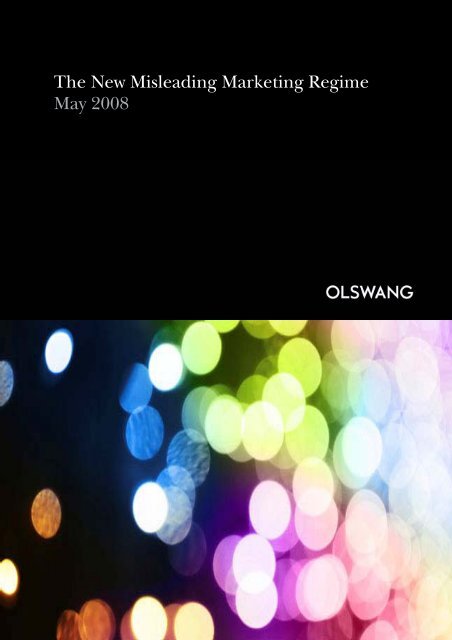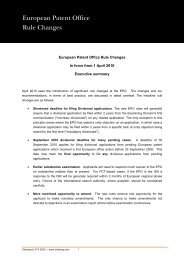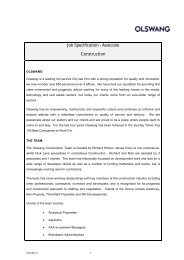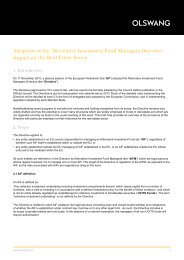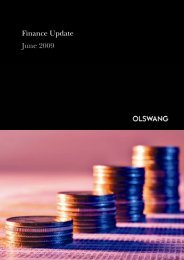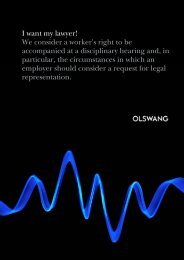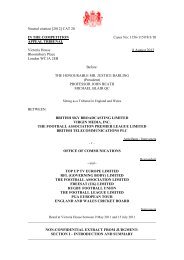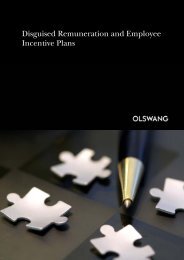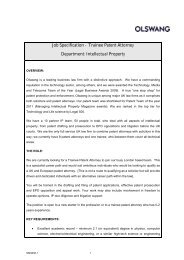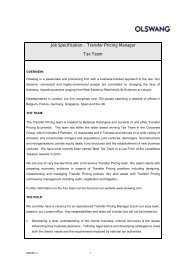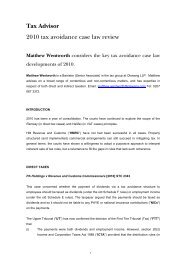Consumer Protection from Unfair Trading Regulations 2008 - Olswang
Consumer Protection from Unfair Trading Regulations 2008 - Olswang
Consumer Protection from Unfair Trading Regulations 2008 - Olswang
Create successful ePaper yourself
Turn your PDF publications into a flip-book with our unique Google optimized e-Paper software.
•<br />
The New Misleading Marketing Regime<br />
May <strong>2008</strong><br />
www.olswang.com 1
On 26 May <strong>2008</strong> two new sets of regulations will come into force in the UK, the first of which protects<br />
consumers <strong>from</strong> unfair, misleading and aggressive commercial practices and the second of which protects<br />
businesses <strong>from</strong> misleading advertising and regulates comparative advertising.<br />
The new regime aims to harmonize and replace existing laws and will apply to both online and offline<br />
businesses. Breaches of the new regulations could result in criminal sanctions and businesses are advised<br />
to review their existing practices to ensure that they do not fall foul of the new regime.<br />
The <strong>Consumer</strong> <strong>Protection</strong> <strong>from</strong> <strong>Unfair</strong> <strong>Trading</strong> <strong>Regulations</strong> <strong>2008</strong> ("<strong>Consumer</strong> <strong>Regulations</strong>") will<br />
regulate commercial practices between businesses and consumers, whilst the Business <strong>Protection</strong> <strong>from</strong><br />
Misleading Marketing <strong>Regulations</strong> <strong>2008</strong> ("Business <strong>Regulations</strong>") will regulate business-to-business<br />
commercial practices and also introduce requirements around comparative advertising.<br />
THE CONSUMER REGULATIONS<br />
The <strong>Consumer</strong> <strong>Regulations</strong> apply across all business sectors. They contain a general prohibition on<br />
"unfair commercial practices" before, during or after transactions. They also prohibit traders <strong>from</strong><br />
misleading consumers and <strong>from</strong> using aggressive commercial practices. In addition, there are 31 specific<br />
commercial practices which are expressly prohibited.<br />
The <strong>Consumer</strong> <strong>Regulations</strong> amend, replace or complement existing consumer law; notably parts of the<br />
Trade Descriptions Act 1968 and the <strong>Consumer</strong> <strong>Protection</strong> Act 1987.<br />
Will your business be affected by the <strong>Consumer</strong> <strong>Regulations</strong>?<br />
The <strong>Consumer</strong> <strong>Regulations</strong> will apply to any conduct by businesses directly connected to the promotion,<br />
sale or supply of products to consumers. Therefore, your business will be affected by the <strong>Consumer</strong><br />
<strong>Regulations</strong> where:<br />
• your business has a direct relationship with consumers;<br />
• your business has a sufficiently close connection with consumers as to fall within the scope of the<br />
<strong>Consumer</strong> <strong>Regulations</strong> (for example, where a trader supplies products to a supermarket to be sold to<br />
shoppers, the trader will need to ensure that their labelling complies with the <strong>Consumer</strong> <strong>Regulations</strong>);<br />
and/or<br />
• your business purchases products <strong>from</strong> consumers.<br />
<strong>Unfair</strong> commercial practices<br />
The <strong>Consumer</strong> <strong>Regulations</strong> contain a general prohibition on "unfair commercial practices" (the "General<br />
Prohibition"). The General Prohibition prohibits practices which:<br />
• fail to meet the standard of professional diligence (i.e. the standard of skill and care that a trader in the<br />
relevant field of activity could reasonably be expected to exercise); and<br />
www.olswang.com 1
• materially distort the economic behaviour of the "average consumer".<br />
Misleading actions and omissions<br />
The <strong>Consumer</strong> <strong>Regulations</strong> prohibit misleading actions and omissions which cause the average consumer<br />
to make a different transactional decision <strong>from</strong> that which they might otherwise have made.<br />
"Misleading actions" include giving false or misleading information to, or deceiving, customers:<br />
• about the existence or the main characteristics of a product;<br />
• about the trader's compliance with a code of conduct; and/or<br />
• by marketing a product in such a way that creates confusion with a competitor's products.<br />
An example would be where a trader sells a television package to a consumer, saying that it includes a<br />
channel which is only available at an additional cost.<br />
"Misleading omissions" include omitting information which the average consumer needs in order to make<br />
an informed decision, or providing information in an unclear, unintelligible, ambiguous or untimely manner.<br />
The context of any omissions, such as limitations of time or space, will be taken into consideration, as will<br />
other steps the trader has taken to convey the information (such as stating that "terms and conditions<br />
apply").<br />
In addition, the <strong>Consumer</strong> <strong>Regulations</strong> provide that if a trader makes an "invitation to purchase" (for<br />
example, by including a page on a website which enables customers to place an order) the invitation must<br />
include specified material information, such as a full description of the advertised product.<br />
Aggressive practices<br />
The <strong>Consumer</strong> <strong>Regulations</strong> prohibit aggressive commercial practices involving harassment, coercion or<br />
undue influence.<br />
This prohibition is aimed at stopping, amongst other things, high-pressure selling techniques that include<br />
intimidation. Examples given by the Guidance issued by the Office of Fair <strong>Trading</strong> include forceful<br />
techniques employed by unscrupulous door-to-door salesmen.<br />
Prohibited practices<br />
The <strong>Consumer</strong> <strong>Regulations</strong> list 31 specific commercial practices which are considered unfair in all<br />
circumstances. The list includes the following practices:<br />
• falsely stating that a product will only be available for a very limited time (or on particular terms for a<br />
limited time);<br />
www.olswang.com 2
• using advertorials which fail to make it clear that a trader had paid for the promotion;<br />
• falsely claiming, or creating the impression, that the trader is not acting for purposes relating to his<br />
trade, business, craft or profession, or falsely representing oneself as a consumer (note that this may<br />
catch certain blogging activities and practices where a trader falsely claims to be a consumer in a<br />
review (whether online or offline) of its own products);<br />
• falsely claiming to be a signatory of a code of conduct;<br />
• displaying a trust or quality mark without authorisation;<br />
• claiming to offer a competition or prize promotion without awarding the prizes described or a<br />
reasonable equivalent;<br />
• including in an advertisement a direct exhortation to children to buy advertised products or persuade<br />
their parents, or other adults, to buy advertised products for them;<br />
• promoting a product similar to the product made by a particular manufacturer in such a manner as to<br />
deliberately mislead the consumer into believing that the product is made by the same manufacturer;<br />
and<br />
• describing a product as "free", "without charge" or similar if the consumer has to pay anything other<br />
than the unavoidable cost of responding, and collecting or paying for delivery of the item.<br />
THE BUSINESS REGULATIONS<br />
Misleading advertising<br />
The Business <strong>Regulations</strong> only apply to business-to-business relationships and they impose a prohibition<br />
on advertising which misleads traders. "Advertising" is defined broadly and includes any form of<br />
representation promoting the supply of goods or services.<br />
In determining whether advertising is misleading, factors taken into account include information the<br />
advertisement contains concerning:<br />
• the characteristics of the product (including its availability, composition, method and date of<br />
manufacture, geographical origin, the results to be expected <strong>from</strong> its use);<br />
• price;<br />
• conditions of supply; and<br />
• the nature or rights of the advertiser (including the advertiser's identity, assets, qualifications,<br />
ownership of intellectual property rights, awards and distinctions).<br />
www.olswang.com 3
Comparative advertising<br />
The second area covered by the Business <strong>Regulations</strong> is comparative advertising.<br />
Comparative advertising will only be permitted if certain conditions are met. The advertising must:<br />
• provide objective comparisons of products on a like-for-like basis;<br />
• not discredit or denigrate a competitor or its brand;<br />
• not take unfair advantage of the reputation of a competitor's brand; and<br />
• not create confusion between the advertiser and competitor, or their brands.<br />
ENFORCEMENT<br />
Both new regulations put a duty to enforce on every "enforcement agency", which includes the Office of<br />
Fair <strong>Trading</strong> and Local Authority <strong>Trading</strong> Standards Services.<br />
However, note that neither set of regulations create any private right of action against traders by<br />
businesses or consumers.<br />
In fulfilling its duty, the enforcement agency can use "established means" to control the unfair practice. For<br />
example, the enforcement agency may decide that, where the remits of the ASA or PhonepayPlus overlap<br />
in relation to any complaint, it may be appropriate to refer the complaint to the existing regulatory body to<br />
be dealt with under the relevant code of practice. If, however, an enforcement agency chooses to take<br />
action under the new regime, such a complaint could lead to a fine or imprisonment. The new legislation<br />
will therefore give teeth to a number of previously self-regulatory codes.<br />
CONSEQUENCES OF A BREACH OF THE REGULATIONS<br />
A breach of the <strong>Consumer</strong> <strong>Regulations</strong> will, in most cases, be a criminal offence. In the case of a breach of<br />
the General Prohibition, the prosecution will have to prove that the trader has knowingly, or recklessly,<br />
breached the requirements of professional diligence. The other offences will be strict liability so it will not<br />
be necessary to prove the state of mind of the trader.<br />
A breach of the Business <strong>Regulations</strong> will constitute a strict liability criminal offence.<br />
The penalties, which apply to breaches of both the <strong>Consumer</strong> <strong>Regulations</strong> and the Business <strong>Regulations</strong>,<br />
are:<br />
• for an offence on summary conviction, a fine of up to £5,000; or<br />
• for an offence on conviction on indictment, an unlimited fine.<br />
www.olswang.com 4
• An officer or a manager of the company who consents to (or acts negligently in relation to) the offence<br />
can be found personally liable and fined or sentenced to up to two years in prison (or both).<br />
DEFENCES<br />
It is a defence to the criminal charge that the offence was caused by factors such as a mistake or accident,<br />
reliance on information provided by another person, the act or default of another person or other causes<br />
beyond the trader's control, provided that the trader can show it took all reasonable precautions and<br />
exercised "due diligence".<br />
In terms of what constitutes due diligence, it may not be sufficient merely to put procedures in place to<br />
prevent the commission of an offence – these procedures would have to be applied and enforced.<br />
However, it will not be possible to understand how the courts will interpret this provision until some case<br />
law exists in this area.<br />
A "mere conduit" defence is also available for publishers of advertisements where the publisher can prove<br />
that they received the advertisement in the course of business and they did not know that the publication of<br />
the advertisement would be an offence.<br />
Arrangements with providers of advertising, publishing services or hosting services, will therefore need to<br />
be framed to ensure that obligations to review content, and associated risks, are properly allocated.<br />
WHAT NOW?<br />
If you think that the regulations are likely to apply to your business you should:<br />
• review your business's practices and guidelines to ensure that they do not fall within any of the<br />
prohibitions set out in either of the regulations;<br />
• consider whether your clearance processes need to be updated to identify content and activities<br />
contrary to either of the regulations; and<br />
• consider risk allocation with partners for new promotional initiatives.<br />
www.olswang.com 5
Key contacts<br />
If you have any queries in relation to the regulations please contact:<br />
Iain Stansfield<br />
Partner<br />
+44 (0)20 7067 3195<br />
iain.stansfield@olswang.com<br />
John Davidson-Kelly<br />
+44 (0)20 7067 3250<br />
john.davidson-kelly@olswang.com<br />
Anouska Spiers<br />
+44 (0)20 7067 3660<br />
anouska.spiers@olswang.com<br />
The information contained in this note is intended as a general review of the subjects featured and<br />
detailed specialist advice should always be taken before taking or refraining <strong>from</strong> taking any<br />
action.<br />
© <strong>Olswang</strong><br />
May <strong>2008</strong><br />
Iain Stansfield<br />
Direct line: +44 20 7067 3195<br />
Email: iain.stansfield@olswang.com<br />
John Davidson-Kelly<br />
Direct line: +44 20 7067 3250<br />
Email: john.davidson-kelly@olswang.com<br />
Anouska Spiers<br />
Direct line: +44 20 7067 3660<br />
Email: anouska.spiers@olswang.com<br />
www.olswang.com 6
London<br />
90 High Holborn<br />
London WC1V 6XX<br />
T +44 (0) 20 7067 3000<br />
F +44 (0) 20 7067 3999<br />
Thames Valley<br />
Apex Plaza, Forbury Road<br />
Reading RG1 1AX<br />
T +44 (0) 20 7067 3000<br />
F +44 (0) 20 7071 7499<br />
Berlin<br />
Potsdamer Platz 1<br />
D-10785 Berlin<br />
T +49 (0) 30 700171-100<br />
F +49 (0) 30 700171-900<br />
Brussels<br />
Avenue Louise 326 bte 26<br />
Louizalaan 326 bus 26<br />
B-1050 Bruxelles/Brussel<br />
T +32 2 647 4772<br />
F +32 2 644 2165<br />
2954545-2


